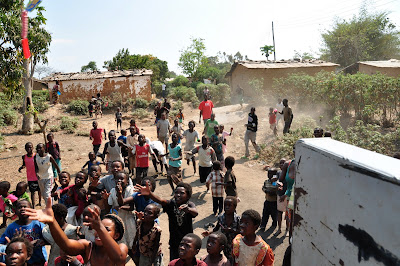Zambian Church Song from Dion Terry on Vimeo.
Today was not a work day. It was the Lord’s day and we had the opportunity to celebrate that with our new friends at the Vineyard church in the compound of Mapalo. This was truly an inspiring experience. There are few people I have seen who worship God with everything they have and Zambians know how to do this with a very genuine spirit. The worship service was a little over 2 hours which I don’t think would ever fly in most of our American churches. I have heard many well meaning Christians say they don’t want to put God in a box, but it seems they are OK with putting Him on the clock. “Spent an hour at church this week God. Read my bible for 30 minutes today God. Sorry God, no time left today for prayer.” I think when we truly worship God in spirit and in truth like John 4:24 says, the clock should not dictate worship.
For me sitting in that pew in Mapalos I truly didn’t care what time it was, even with the hot African sun slowly turning that church building into an oven. The praise and worship (singing) part of the service must have lasted around 1 hour and only 1 song was sung in English with the rest being sung in Bemba. But even the language barrier didn’t effect our desire to be there. The Lord was moving and we were all too willing to drink in whatever His Spirit had to offer.
A missionary gave the message since the pastor was away that day. He is a native Zambian who has spent the last 5 years in Somalia as a missionary sharing the gospel. He is now committing to the next 3 years back here in Zambia with a heart and focus of sharing the truth of the gospel with Muslims. His message was awesome! No notes and completely on task the whole way through. He shared that believers in Jesus Christ need to be reproducing other believers. The reasons they might not be reproducing is the same reasons people do not physically reproduce. (you know..babies)
1.) If we are immature we will not reproduce. The same way a child does not, and should not, reproduce.
2.) When we have no relationship with Jesus we can not reproduce. The same way a non married person does not (should not) reproduce.
3.) If we know Jesus but have no intimacy with Him we can not reproduce. The same way a married couple can be married but if they don’t share an intimate relationship they will not reproduce.
I should mention be the way that I did not receive the gift of tongues and suddenly understand Bemba, thankfully they had a translator so that the message was shared in both tongues.
At the end of the service an elderly woman stepped forward and prayed for our team from America. This was in Bemba but we were still very honored and humbled to have that church cover us with prayer.
This was an incredible way to end our stay in Ndola. Having our last full day there be a Sunday meant a lot to me personally as we were able to worship corporately with those we had been working with all week. Also having gained some perspective of the life in Zambia made us feel less like outsiders and more like family during this worship service. (More on that tomorrow) Overall I would say that if you ever find yourself in Zambia and specifically in the area of Mapalo, make sure you go to church. It is incredible refreshment for the soul.














































